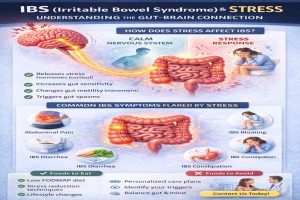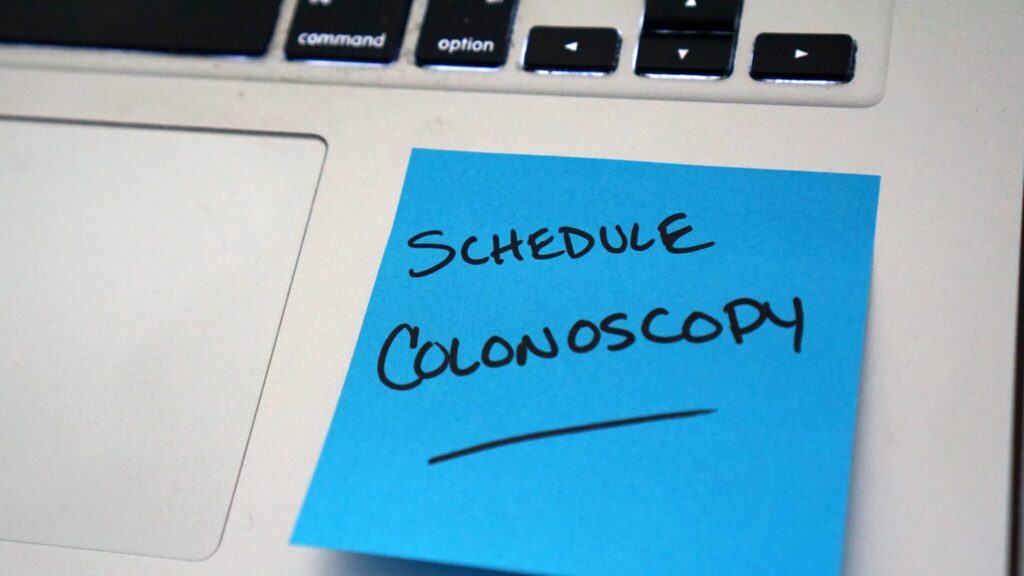
IBS (Irritable Bowel Syndrome) and Stress: Understanding the Gut-Brain Connection
BS (Irritable Bowel Syndrome) is one of the most common digestive disorders, affecting millions of people worldwide. Many patients notice

BS (Irritable Bowel Syndrome) is one of the most common digestive disorders, affecting millions of people worldwide. Many patients notice

Introduction
A colonoscopy is a standout preventive measure and diagnostic tool within gastroenterology, playing a vital role in identifying and thwarting colon cancer and other gastrointestinal conditions. This expanded guide delves into a colonoscopy’s significance, preparatory steps, the procedure itself, and subsequent care, aiming to empower readers with detailed knowledge to make informed health decisions.
What is a Colonoscopy?
A colonoscopy is a medical procedure allowing gastroenterologists to inspect the colon (large intestine) and rectum’s inner lining. Utilizing an endoscope—a slender, flexible instrument fitted with a video camera—physicians can observe the colon’s images on a display and conduct diagnostic or therapeutic actions, such as biopsies or polyp removals. This examination is pivotal in identifying conditions like colorectal cancer and inflammatory bowel disease, offering a preventive measure that can significantly alter health outcomes. The procedure’s ability to provide real-time visuals and perform immediate interventions makes it an unparalleled tool in gastrointestinal health management.
The Importance of a Colonoscopy
A colonoscopy stands as a critical defense against colon cancer, dramatically lowering the disease’s incidence by facilitating the early detection and extraction of precancerous growths. It is the most comprehensive screening method for colorectal cancer—the third most prevalent cancer globally—enabling early intervention and significantly improving treatment efficacy and patient survival rates. pBeyond cancer prevention, colonoscopies can detect various gastrointestinal diseases early offering a chance for timely treatment and management. This test’s preventive aspect is underscored by its capacity to identify health issues before they become symptomatic, potentially saving lives through early intervention.
Preparing for Your Colonoscopy
Preparation for a colonoscopy is critical, involving a detailed regimen to ensure the colon is entirely clear. This process typically starts with a diet low in fiber, transitioning to a clear liquid diet, followed by the consumption of a bowel-cleansing solution. The preparation may be uncomfortable, involving fasting and laxatives, but it’s essential for a successful examination. Adequate preparation allows for clear visibility of the colon’s lining, enabling the detection of anomalies that would otherwise be obscured. Patients are encouraged to closely follow their doctor’s instructions and communicate any difficulties they encounter during the prep phase, as the effectiveness of the colonoscopy is heavily dependent on this preparatory step.
What Happens During a Colonoscopy?
Administered under sedation for patient comfort, the procedure involves the gentle insertion and navigation of the endoscope through the rectum into the colon. The device inflates the colon with air for better visibility and sends video images to a monitor, allowing for a thorough examination. If necessary, tools can be passed through the endoscope to remove polyps or collect tissue samples. This procedure, typically lasting between 30 to 60 minutes, is meticulously performed by experienced gastroenterologists who specialize in colon health. Understanding the procedural steps can alleviate anxiety, making patients more comfortable with the process and its significance in maintaining gastrointestinal health.
After the Procedure: What to Expect
Post-procedure recovery is generally quick, with patients often resuming normal activities the following day. Some may experience temporary discomfort, such as bloating or mild cramps due to the air introduced during the examination. It’s crucial for patients to have arranged transportation home, as the sedatives administered can impair driving ability. Following the procedure, patients should monitor their recovery, noting any unusual symptoms and consulting their healthcare provider as needed. The ability to quickly return to daily routines post-colonoscopy underscores the procedure’s non-invasive nature, contributing to its status as a preferred method for colon examination.
Understanding the Results
Colonoscopy results can range from finding no abnormalities—indicating a healthy colon—to identifying polyps or signs of cancer. Removed polyps are analyzed in a laboratory to determine their nature, with findings discussed in a follow-up appointment. Depending on the results, further screenings, treatments, or preventive measures may be recommended. This feedback is crucial for developing a personalized health strategy, emphasizing the procedure’s role in proactive health management. Patients are encouraged to engage in open dialogue with their healthcare provider about their results and next steps, fostering an informed approach to their health journey.
The Risks Associated with a Colonoscopy
While colonoscopies are safe, they are not without risks, which may include sedative reactions, bleeding from polyp removal sites, or, in rare instances, perforation of the colon wall. These risks highlight the importance of selecting a highly skilled and experienced gastroenterologist to minimize potential complications. Understanding these risks allows patients to make informed decisions about their healthcare, weighing the procedure’s significant benefits against its low risk profile.
Colonoscopy vs. Other Diagnostic Methods
A colonoscopy is compared with alternative screening methods like stool tests, flexible sigmoidoscopy, and CT colonography, each with its own set of advantages and limitations. However, a colonoscopy is regarded as the gold standard for its comprehensive view of the entire colon and the ability to perform biopsies and remove polyps in a single procedure. This direct examination method offers unparalleled accuracy and efficiency in diagnosing and preventing colorectal cancer and other gastrointestinal diseases.
Who Should Get a Colonoscopy?
Recommendations suggest that individuals at average risk for colorectal cancer begin regular screenings at age 45, with those having a family history of the disease or other risk factors potentially starting earlier. This proactive approach to health screening is crucial for early detection and treatment of colorectal cancer and other conditions, emphasizing the role of colonoscopy in preventive health care. Individuals are advised to consult with their healthcare provider to determine their risk level and appropriate screening schedule, ensuring personalized and effective health management.
How Often Should You Have a Colonoscopy?
The frequency of colonoscopy screenings is determined by the initial findings, personal and family health history, and overall risk factors. For those at average risk with no detected polyps, screenings are typically recommended every ten years. Those with identified polyps or higher risk factors may require more frequent screenings, underscoring the importance of tailored health care strategies based on individual risk assessments. Engaging in regular screenings is a key component of preventive health care, offering peace of mind and foundational health monitoring.
The Role of Diet in Colon Health
Dietary choices play a significant role in maintaining colon health and preventing cancer. A balanced diet rich in fruits, vegetables, whole grains, and low in processed and red meats can contribute to a healthy colon and reduce the risk of colorectal cancer. Incorporating dietary fiber, limiting alcohol consumption, and avoiding tobacco are additional preventive measures that support gastrointestinal health. Nutritional strategies, coupled with regular physical activity, form the cornerstone of a holistic approach to colon health, emphasizing the power of lifestyle choices in disease prevention.
How Technology Is Improving Colonoscopies
Technological advancements are revolutionizing colonoscopies, making them more effective, less invasive, and more comfortable for patients. Innovations in imaging, such as high-definition cameras and narrow-band imaging, enhance the detection of polyps and other abnormalities, improving diagnostic accuracy. These technological strides not only improve patient outcomes but also enhance the overall colonoscopy experience, solidifying its role as an essential tool in gastrointestinal health care.
Myths and Facts About Colonoscopy
Misconceptions about colonoscopies can deter individuals from undergoing this critical screening. Addressing common myths—such as the procedure being excessively painful or unnecessary for those without symptoms—with factual information is vital in promoting informed health decisions. A colonoscopy is a minimally invasive, highly effective method for detecting and preventing colorectal cancer, accessible to individuals of all genders and most ages. Dispelling myths and providing accurate information encourages wider participation in colon cancer screening, contributing to improved public health outcomes.
Choosing the Right Gastroenterologist for You
Selecting the right gastroenterologist is crucial for a positive colonoscopy experience. Factors to consider include the physician’s expertise, experience level, patient reviews, and your comfort with their approach to care. A strong doctor-patient relationship fosters open communication, enhancing the quality of care and patient satisfaction. Patients are encouraged to research and consult with multiple gastroenterologists to find the best fit for their health care needs, ensuring a supportive and collaborative approach to their colon health journey.
Conclusion
A colonoscopy stands as a cornerstone in preventive health care, offering a proactive defense against colorectal cancer and other gastrointestinal conditions. This in-depth exploration of colonoscopy—from its preparatory steps to the procedure itself, and through to post-procedure care—aims to arm readers with comprehensive knowledge, enabling informed health decisions. The importance of regular screenings, coupled with a healthy lifestyle, cannot be overstated in maintaining colon health and overall well-being.
For those seeking expert care and guidance on colonoscopy, Colon & Digestive Health Specialists are at your service. With a dedicated team led by Understanding colorectal cancer risk factors is crucial for early detection and prevention. With his gastroenterology expertise, Karim Shakoor, M.D. can provide in-depth knowledge on the subject. By consulting with Dr. Shakoor, you can gain valuable insights into the most critical risk factors associated with colorectal cancer., we offer a supportive, patient-centered approach to preventive health care. Located at 1805 Honey Creek Commons, Ste B, Conyers, GA 30013, our clinic is committed to providing comprehensive evaluations and treatments tailored to your individual health needs.
Whether you’re due for a screening or have questions about colon health, we invite you to reach out to us. Contact Colon & Digestive Health Specialists at (770) 922-7000 to schedule an appointment or visit our website for more information. Prioritizing your colon health is a significant step towards a healthier life, and we’re here to support you every step of the way.
© 2024 All Rights reserved © 2024 by Colon & Digestive Health Specialists